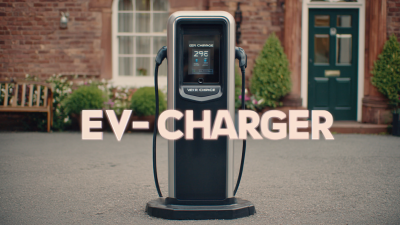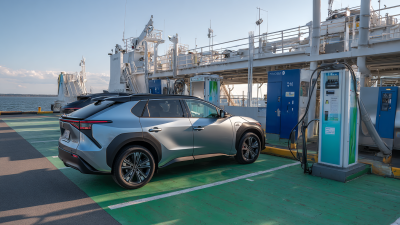As the world accelerates toward a sustainable future, electric vehicles (EVs) are becoming increasingly prevalent on our roads. One of the pivotal factors in this transition is the development of innovative EV car adapter solutions, which play a crucial role in making electric vehicle charging more accessible and efficient. In this ultimate guide, we will explore the various trends and advancements in EV car adapters, highlighting how these technologies are reshaping the charging landscape. From rapid charging options to smart connectivity features, understanding these innovations will empower consumers and businesses alike to embrace electric mobility confidently. Join us as we delve into the future of electric vehicle charging and discover how EV car adapters are set to revolutionize the driving experience while contributing to a greener planet.

The evolution of electric vehicle (EV) charging technologies is poised to transform the automotive landscape significantly. According to a report by the International Energy Agency (IEA), the number of electric vehicles on the road is expected to reach 145 million globally by 2030, driving an increased demand for efficient and innovative charging solutions. The development of ultra-fast charging stations, capable of delivering up to 350 kW, is crucial for enhancing the EV experience by significantly reducing charging times to approximately 15-30 minutes. This advancement allows EV owners to quickly recharge during longer trips, paralleling the convenience offered by traditional fueling methods.
In parallel, innovative EV car adapter solutions play a vital role in promoting compatibility across various vehicle models and charging infrastructures. Research from McKinsey & Company suggests that standardized charging connectors and smart adapters can simplify the user experience while fostering market growth. These advancements not only facilitate seamless charging for consumers but also support the scaling up of EV production by automakers. As we look towards a future where EV adoption increases, these technological innovations will be instrumental in building a robust and user-friendly charging ecosystem that meets the needs of tomorrow's drivers.
| Charging Technology | Charging Speed (kW) | Adapter Compatibility | Estimated Cost ($) | Deployment Year |
|---|---|---|---|---|
| Level 1 AC Charging | 1.4-2.4 | NEMA 5-15 | 200 | 2020 |
| Level 2 AC Charging | 3.3-19.2 | J1772 | 500-600 | 2022 |
| DC Fast Charging | 50-350 | CHAdeMO, CCS | 10,000-40,000 | 2025 |
| Wireless Charging | 3.6-11 | N/A | 2,500-5,000 | 2023 |
| Ultra-Fast Charging | 350+ | N/A | 40,000+ | 2030 |
The landscape of electric vehicle (EV) charging is rapidly evolving, thanks to innovative EV car adapter solutions. With the advent of new technologies, the way we look at charging infrastructure is changing significantly. A recent report indicates that the electric vehicle market is projected to grow considerably, with up to three million EVs expected on the roads in states like New York by 2025. This surge in EV adoption underscores the need for versatile and efficient charging adapters that can cater to diverse vehicle models and charging standards.
Emerging innovations in EV car adapters include advancements in battery swap technology, which has shown promise in reducing range anxiety—one of the major barriers to EV adoption. For instance, reports suggest that battery swapping stations can fully charge an EV in as little as five minutes, enabling quick turnaround for drivers. Moreover, as various vehicle manufacturers unveil upcoming models, such as SUVs and trucks, it becomes increasingly important for car owners to stay informed about compatible charging technologies.
Tip: Opt for adapters that support multiple charging standards to ensure compatibility with future EV models.
Tip: Consider charging solutions that offer rapid charging capabilities, enhancing convenience and reducing downtime.
The future is bright for EV drivers, with ongoing innovations paving the way for a more accessible and efficient electric vehicle experience.
The shift towards electric vehicles (EVs) has significantly transformed the driving experience, and user-friendly charging solutions are at the heart of enhancing EV ownership. As we witness the rapid growth of the EV market, innovations in charging technology emerge, making the process simpler and more accessible for all drivers. Recent advancements, such as streamlined public charging features and portable charging options, are redefining the typical barriers associated with EV charging. These developments cater to the need for efficient infrastructure, especially in urban areas where the demand is surging.
Moreover, emerging technologies, like smart reservation systems for charging spots, are revolutionizing how we approach charge management. These innovations allow drivers to reserve their charging time in advance, reducing anxiety over availability—a common concern among EV users. Additionally, standardized Plug & Charge systems are simplifying the charging process, enabling seamless connections that enhance user experience. As charging solutions evolve, they not only support the growing number of EVs on the road but also ensure that the transition to electric mobility is as smooth and user-friendly as possible.
As the adoption of electric vehicles (EVs) accelerates, the importance of a sustainable charging infrastructure becomes increasingly apparent. According to the International Energy Agency, the number of EVs on the road could reach 145 million by 2030, necessitating a robust network of charging stations to support this growth. To ensure that this infrastructure is not merely reactive but also forward-thinking, innovative solutions such as EV car adapters are crucial. These adapters facilitate compatibility between various charging systems, easing the transition for consumers while reducing range anxiety—the fear of running out of battery power.
Moreover, investing in sustainable charging solutions can significantly diminish the carbon footprint of EV usage. A report by the U.S. Department of Energy highlights that 60% of charging stations could be powered by renewable energy sources by 2035, further enhancing the environmental benefits of electric vehicles. The push for smart grids and energy-efficient technologies signifies that future charging stations will not only charge EVs but also contribute to energy management by discharging stored energy back into the grid during peak demand. This innovative approach reinforces the vision of a greener future while ensuring that the charging infrastructure evolves alongside the growing fleet of electric vehicles.
The evolution of electric vehicle (EV) charging is being significantly influenced by advancements in smart technology. Recent reports indicate that the global smart EV charging market is projected to reach $40.5 billion by 2027, with a compound annual growth rate (CAGR) of 21.4% from 2020 to 2027. This rapid growth underscores the increasing demand for sophisticated charging solutions that enhance user convenience and efficiency. Smart chargers can optimize energy usage, enabling charging during off-peak hours to minimize costs, while integrated software can provide real-time data on charging status and energy consumption.
Moreover, innovative EV car adapter solutions are incorporating internet connectivity and artificial intelligence to improve the overall charging experience. For instance, smart technology can enable remote access to charging schedules and preferences, ensuring users always have their vehicles charged and ready. According to a recent study by Navigant Research, over 60% of EV owners expressed interest in using smart charging features to manage their home energy use more effectively. This shift not only contributes to higher efficiency in energy consumption but also plays a pivotal role in balancing the grid by mitigating peak demand pressures, ultimately supporting a more sustainable energy future.














